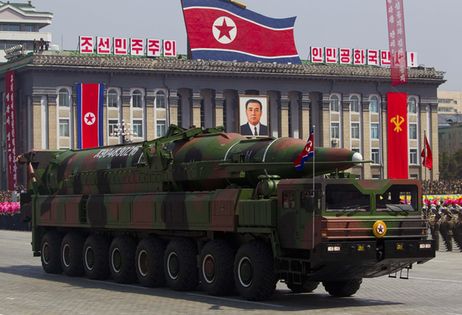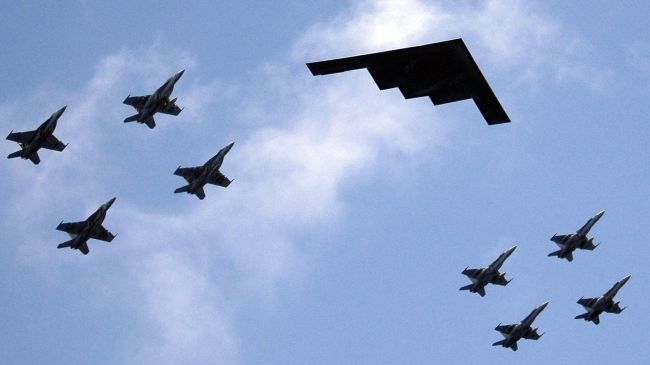
National Paranoia is the Irrational Fear that You’re Being Threatened Which is the more paranoid statement?1. AMERICAN MEDIA: “North Korea is threatening to attack us with nuclear weapons,”or:
2. NORTH KOREAN MEDIA: “The United States is threatening to attack us with nuclear weapons.”
Taking recent events in the U.S. and the Korean peninsula as evidence, while mostly ignoring historical context, the drift toward another American war in Asia can be seen as clearly as the ambiguous moves and countermoves of countries with no obvious motive for war might allow, producing headlines like [1]this[1] in the New York Times of April 4:
“North Korea Moves Missile to Coast, but Little Threat is Seen”
According to the Times, “North Korea has been issuing a blistering series of similar threats in recent weeks, citing as targets the American military installations in the Pacific islands of Hawaii and Guam, as well as the United States mainland.”
One reason such threats are not always seen as threatening is that North Korea has no missile that can reach the U.S. mainland, [2]and[2] quite likely not even Alaska, Hawaii, or Guam, never mind whether they have any long range missile that can hit anything with any accuracy.
North Koreans Move Missile Closer to U.S.!
The South Korean defense chief reported April 4 that the North Koreans had moved one longish-range missile to its east coast, maybe 200 miles closer to the U.S., but that missile was still not close enough to come close to the U.S. west coast. Nevertheless, American bases in South Korea and Japan are still presumably reachable targets, as are Korean and Japanese civilians. Most of China and eastern Russia are also within range. [Later reports said the North Koreans had movedtwo mobile missiles to the coast.]
The U.S. recently deployed a land-based anti-missile missile system to Guam, which is beyond the range of North Korea’s operational missiles. The U.S. has also moved at least two Aegis-class missile-cruisers to patrol waters close to North Korea. While the Aegis system [3]has[3] the capability of attacking targets on land, in the air, and under water, its most notable exploit to date was the 1988 downing of an Iranian passenger plane, killing 290 civilians.
On March 29, CNN reported somewhat breathlessly that “North Korea has entered a ‘state of war’ with neighboring South Korea,” which ignores the reality that the state of war between the two countries has existed since 1950, although an armistice [4]was[4] agreed to in 1953. Fitful efforts to negotiate a formal peace treaty have continued for 60 years, leaving the United Nations Command in place to the present. North Korea has previously rejected the armistice at least five other times, in 1994, 1996, 2003, 2006, and 2009.
Americans Should Be Afraid of Missiles that Can’t Reach America
Exaggerating the CNN story, the Newsweek/Daily Beast editors gave [5]it[5] this scary headline —“North Korea Prepares Strike on U.S.’ – that had no meaningful basis in reality. Amplifying the fear the next day, NBC News [6]ran[6] a disappointingly low-key story under the ramped-up headline:
North Korea puts rockets on standby asUS official warns regime is no ‘paper tiger’
Peter Hart of FAIR [7]has[7] explored the one-sidedness of American media coverage and its reality-distorting effect in detail.
One reason the North Koreans moved their missile was in response to the March 28 U.S. fly-bys along the South Korean border with B-2 bombers quite capable of carrying enough nuclear weapons to obliterate North Korea and set off nuclear winter around the world. Just because these fly-bys with B-2s, B-52s and other potentially nuclear-armed aircraft were part of military exercises the U.S. and South Koreans put on every year (sometimes using a pretend scenario of invading the North), the U.S. maintains the North shouldn’t think of them as in the least provocative. The B-2s flew from a base in Missouri.
Another North Korean reason for moving their missile might have been the American plans to conduct missile defense drills with Japan and South Korea on an on-going basis. This plan follows the “signal” sent earlier in the winter when the U.S. announced plans to increase its anti-missile missile deployment in Alaska and along the Pacific west coast.
China Votes for Sanctions, but Remains Wild Card
On March 7, the United Nations Security Council unanimously (15-0) approved a resolution brokered by the U.S. and Chine, imposing new economic sanctions on North Korea as punishment for its announcement on February 12, confirming [8]its[8] third nuclear weapons test. While many nations detected seismic activity that they interpreted to be an underground nuclear explosion, and while the Nuclear Test Ban Treaty monitors said the tremor had “clear explosionlike characteristics,” there was no detection of radiation sufficient to confirm that the explosion was nuclear.
North Korea’s admission that it had used a “miniaturized nuclear device with greater explosive force than previously” was seen by some as defiance of Chinese advice against such a test. The Chinese had promised that North Korea would “pay a heavy price” if it went ahead with the test. That price apparently includes China’s cooperation with the U.S. on setting sanctions.
Complicating the response to the test announcement, there are few sanctions left to apply to North Korea, perhaps the world’s second most-sanctioned country after Israel [the U.N. has voted 66 sanctions against Israel, all or most of which Israel ignores with little consequence]. The new North Korea sanctions [9]bar[9] all nations from selling the North expensive jewelry, yachts, luxury automobiles, and racing cars.
U.S. Ambassador to the U.N. Susan Rice said that, “taken together, these sanctions will bite, and bite hard.”
That will depend on China, which has previously helped North Korea get around sanctions, seeming to have less concern for the country across the border having nuclear weapons than having it devolve into instability and chaos. So the current round of sanctions, like earlier ones, will have limited impact unless China should decide to limit its oil shipments, banking services, and other ongoing aid to North Korea.
Anyone Ready for an Act of War, like a Naval Blockade?
Another factor limiting the effectiveness of sanctions has been the unwillingness of the U.S. and other nations to enforce sanctions with a naval blockade, which would be an act of war. And it would be an act of war against a Chinese ally, enforced in the waters off the Chinese mainland.
The announced nuclear test in February came a few weeks after the Security Council had voted unanimously for a resolution in favor of tightening sanctions on North Korea for launching a three-stage rocket in December.
At this point, no one is claiming that North Korea actually has any nuclear warheads, or any actual capacity to deliver one anywhere.
But North Korean [DPRK] bristling continued on April 4, as an unnamed army official suggested [10]that[10]:
“…the moment of explosion is approaching fast. No one can say a war will break out in Korea or not and whether it will break out today or tomorrow…. The responsibility for this grave situation entirely rests with the U.S. administration and military warmongers keen to encroach upon the DPRK’s sovereignty and bring down its dignified social system with brigandish logic.”
Anonymous U.S. Official Wonders About U.S. Over-reacting
The same day, at the Pentagon, an unnamed Defense Department official, took a look in the mirror and referred to U.S. bellicosity about its own military actions, saying:
“We accused the North Koreans of amping things up, now we are worried we did the same thing…. We are trying to turn the volume down. We are absolutely trying to ratchet back the rhetoric. We become part of the cycle. We allowed that to happen.”
In South Korea, which would likely suffer most from an outbreak of hostilities, one observer there considered the North Korea news reporting “all hype.” Adam Hogue graduated from Keene State College in New Hampshire in 2011 and has been living and working in South Korea ever since. On April 2, [11]he[11] wrote:
“There is a need to create a culture of panic in the United States and, arguably, everywhere else where the major media conglomerates have established news outlets….
“As I have heard from my mother, father, sister, friends, the New York Times, CNN and NPR, North Korea is suddenly big news. They are now something to fear. They are something threatening, mysterious and suddenly worthy of all the news headlines in the western-world. There is an urgent message being told that now is a time to panic and react….
“But, that message is not coming from my co-workers at school or from the Korean news or from my neighbors; it is a message from the media.”
American Paranoid Policy Heightened since 9-11
So it seems, in answer to the paranoia question at the beginning of this piece: the U.S. appears to have a comfortable lead in maintaining delusions of being threatened.
While the threats to North Korea are real and existential, that doesn’t preclude some paranoia at the same time: consider the suggestion [13]that[13] the 2010 torpedo-sinking of a South Korean ship – blamed on North Korea and raising war fears – was actually a false flag operation by the Israeli navy using a state-of-the-art German submarine [Israel [12]has[12] a small fleet, armed with nuclear-warhead missiles].
On January 29, 2002, in his first State of the Union address, President George Bush declared that North Korea was part of “an axis of evil” along with Iraq and Iran – nations that, while not an axis in the usual sense, got grouped by President Bush’s belief that they were all developing weapons of mass destruction with which “to threaten the peace of the world.”
Still searching for those weapons of mass destruction, the U.S. has [14]now[14] offered to sell South Korea 60 F-35 Joint Strike Fighter stealth bombers at a discount price of $180 million per plane. If the North Koreans are paying attention, they will not feel immediately threatened by this possible sale of a plane that is at least five years from being operational and still struggling in its test phase.
The F-35 may be more of an economic threat to South Korea.
Notes
[1] http://www.nytimes.com/2013/04/05/world/asia/north-korean-missile-moved-to-coast.html?hp&_r=1&
[2] http://www.washingtonpost.com/blogs/worldviews/wp/2013/04/04/map-this-is-how-far-those-north-korean-missiles-can-actually-reach/
[3] https://en.wikipedia.org/wiki/Aegis_Combat_System
[4] http://en.wikipedia.org/wiki/Korean_Armistice_Agreement
[5] http://www.thedailybeast.com/cheats/2013/03/29/north-korea-prepares-strike-on-u-s.html?utm_medium=email&utm_source=newsletter&utm_campaign=cheatsheet_morning&cid=newsletter%3Bemail%3Bcheatsheet_morning&utm_term=Cheat Sheet
[6] http://worldnews.nbcnews.com/_news/2013/03/29/17513218-north-korea-puts-rockets-on-standby-as-us-official-warns-regime-is-no-paper-tiger?lite
[7] http://readersupportednews.org/opinion2/277-75/16789-north-korea-rattles-sabres-us-pretends-to-drop-nuclear-bombs-on-them-
[8]http://www.thestar.com/news/world/2013/03/07/north_korea_vows_preemptive_nuclear_strike_against_us_ahead_of_un_vote.html
[9] http://www.globalpolicy.org/security-council/index-of-countries-on-the-security-council-agenda/north-korea.html
[10] http://www.cnn.com/2013/04/04/politics/koreas-u-s-/index.html
[11] http://www.policymic.com/articles/32263/north-korea-news-is-all-hype
[12] http://www.spiegel.de/international/world/israel-deploys-nuclear-weapons-on-german-built-submarines-a-836784.html
[13] http://abundanthope.net/pages/Political_Information_43/ISRAEL-S-SECRET-WAR-AGAINST-NORTH-KOREA.shtml
[14] http://www.defenseworld.net/news/8160/U_S_Offers_Korea_F_35_Aircraft_At_Subsidized_Rates – .UV8FwavwLB8
http://www.globalresearch.ca/u-s-to-america-be-afraid-the-north-koreans-are-coming/5330817



 The resolution, Senate Resolution 65,
The resolution, Senate Resolution 65, 